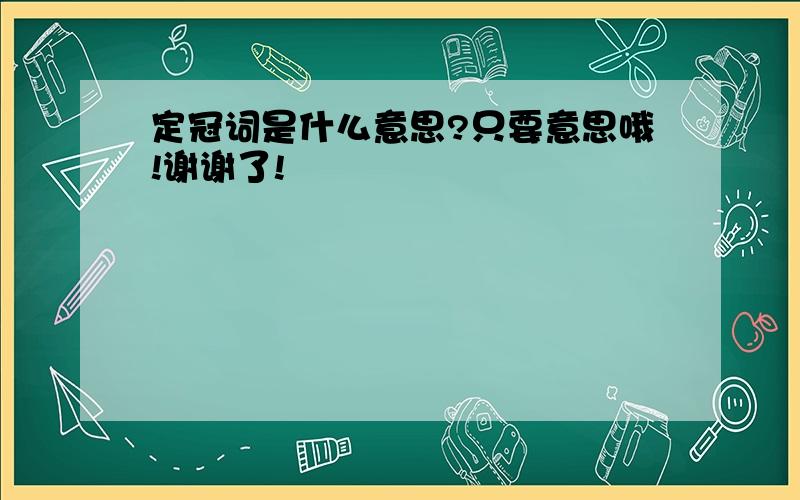定冠词是什么意思?只要意思哦!谢谢了!
来源:学生作业帮助网 编辑:作业帮 时间:2024/11/29 17:21:23

定冠词是什么意思?只要意思哦!谢谢了!
定冠词是什么意思?
只要意思哦!谢谢了!
定冠词是什么意思?只要意思哦!谢谢了!
定冠词the的用法:
定冠词the与指示代词this,that同源,有“那(这)个”的意思,但较弱,可以和一个名词连用,来表示某个或某些特定的人或东西.
(1)特指双方都明白的人或物
Take the medicine. 把药吃了.
(2)上文提到过的人或事
He bought a house. 他买了幢房子.
I've been to the house. 我去过那幢房子.
(3)指世界上独一无二的事物
the sun, the sky, the moon, the earth
(4)单数名词连用表示一类事物
the dollar 美元
the fox 狐狸
或与形容词或分词连用,表示一类人
the rich 富人
the living 生者
(5)用在序数词和形容词最高级,及形容词 等前面
Where do you live? 你住在哪?
I live on the second floor. 我住在二楼.
That's the very thing I've been looking for. 那正是我要找的东西.
(6)与复数名词连用,指整个群体
They are the teachers of this school. (指全体教师)
They are teachers of this school. (指部分教师)
(7)表示所有,相当于物主代词,用在表示身体部位的名词前
She caught me by the arm. 她抓住了我的手臂.
(8)用在某些有普通名词构成的国家名称,机关团体,阶级等专有名词前
the People's Republic of China 中华人民共和国
the United States 美国
(9)用在表示乐器的名词前
She plays the piano. 她会弹钢琴.
(10)用在姓氏的复数名词之前,表示一家人
the Greens 格林一家人(或格林夫妇)
(11)用在惯用语中
in the day, in the morning...
the day before yesterday, the next morning...
in the sky...
in the dark...
in the end...
on the whole, by the way...
参考资料:书上写的跟网上找的没什么区别,至少上海交大的教材上就是这么写的.
定冠词就是the
也只有the是定冠词
它是放在名词前面的,表示指定的某个事物
定冠词the的用法:
定冠词the与指示代词this,that同源,有“那(这)个”的意思,但较弱,可以和一个名词连用,来表示某个或某些特定的人或东西。
(1)特指双方都明白的人或物
Take the medicine. 把药吃了。
(2)上文提到过的人或事
He bought a house. 他买了幢房子。
I've been to ...
全部展开
定冠词the的用法:
定冠词the与指示代词this,that同源,有“那(这)个”的意思,但较弱,可以和一个名词连用,来表示某个或某些特定的人或东西。
(1)特指双方都明白的人或物
Take the medicine. 把药吃了。
(2)上文提到过的人或事
He bought a house. 他买了幢房子。
I've been to the house. 我去过那幢房子。
(3)指世界上独一无二的事物
the sun, the sky, the moon, the earth
(4)单数名词连用表示一类事物
the dollar 美元
the fox 狐狸
或与形容词或分词连用,表示一类人
the rich 富人
the living 生者
(5)用在序数词和形容词最高级,及形容词 等前面
Where do you live? 你住在哪?
I live on the second floor. 我住在二楼。
That's the very thing I've been looking for. 那正是我要找的东西。
(6)与复数名词连用,指整个群体
They are the teachers of this school. (指全体教师)
They are teachers of this school. (指部分教师)
(7)表示所有,相当于物主代词,用在表示身体部位的名词前
She caught me by the arm. 她抓住了我的手臂。
(8)用在某些有普通名词构成的国家名称,机关团体,阶级等专有名词前
the People's Republic of China 中华人民共和国
the United States 美国
(9)用在表示乐器的名词前
She plays the piano. 她会弹钢琴。
(10)用在姓氏的复数名词之前,表示一家人
the Greens 格林一家人(或格林夫妇)
(11)用在惯用语中
in the day, in the morning...
the day before yesterday, the next morning...
in the sky...
in the dark...
in the end...
on the whole, by the way...
参考资料:书上写的跟网上找的没什么区别,至少上海交大的教材上就是这么写的。34|评论(1)
求助知友zhaoqianglee |五级采纳率39%
收起
冠词是虚词,本身不能单独使用,也没有词义,它用在名词的前面,帮助指明名词的含义。英语中的冠词有三种,一种是定冠词(the Definite Article),另一种是不定冠词(the Indefinite Article),还有一种是零冠词(Zero Article)。
不定冠词a (an)与数词one 同源,是"一个"的意思。a用于辅音音素前,一般读作[e],而an则用于元音音素前,一...
全部展开
冠词是虚词,本身不能单独使用,也没有词义,它用在名词的前面,帮助指明名词的含义。英语中的冠词有三种,一种是定冠词(the Definite Article),另一种是不定冠词(the Indefinite Article),还有一种是零冠词(Zero Article)。
不定冠词a (an)与数词one 同源,是"一个"的意思。a用于辅音音素前,一般读作[e],而an则用于元音音素前,一般读做[en]。
1) 表示"一个",意为one;指某人或某物,意为a certain。
A Mr. Ling is waiting for you.
2) 代表一类人或物
A knife is a tool for cutting with.
Mr. Smith is an engineer.
定冠词the与指示代词this,that同源,有"那(这)个"的意思,但较弱,可以和一个名词连用,来表示某个或某些特定的人或东西。
定冠词的用法:
1)特指双方都明白的人或物:
Take the medicine. 把药吃了。
2)上文提到过的人或事:
He bought a house. I've been to the house.
他买了幢房子。我去过那幢房子。
3)指世上独一物二的事物:
the sun, the sky, the moon, the earth
4)单数名词连用表示一类事物,如:the dollar 美元;
the fox 狐狸;或与形容词或分词连用,表示一类人:the rich 富人; the living 生者。
5)用在序数词和形容词最高级,及形容词only, very, same等前面:
Where do you live? I live on the second floor. 你住在哪?我住在二层。
That's the very thing I've been looking for. 那正是我要找的东西。
6)与复数名词连用,指整个群体:
They are the teachers of this school.指全体教师)
They are teachers of this school. (指部分教师)
7)表示所有,相当于物主代词,用在表示身体部位的名词前:
She caught me by the arm.. 她抓住了我的手臂。
8)用在某些由普通名词构成的国家名称、机关团体、阶级、等专有名词前:
the People's Republic of China 中华人民共和国
the United States 美国
9)用在表示乐器的名词之前: She plays the piano. 她会弹钢琴。
10) 用在姓氏的复数名词之前,表示一家人:
the Greens 格林一家人 (或格林夫妇)
11) 用在惯用语中:
in the day, in the morning (afternoon,evening), the day after tomorrow
the day before yesterday, the next morning,
in the sky (water,field,country)
in the dark, in the rain, in the distance,
in the middle (of), in the end,
on the whole, by the way, go to the theatre
收起